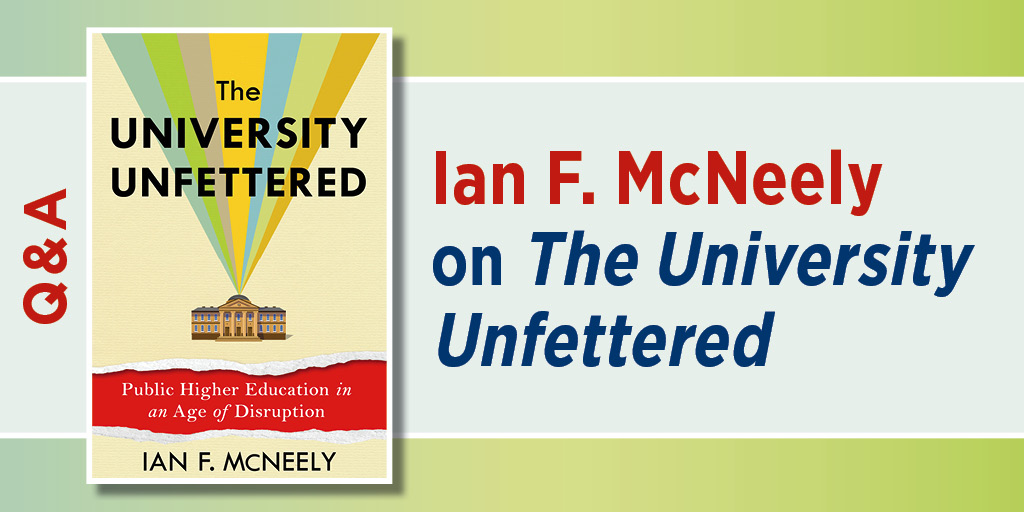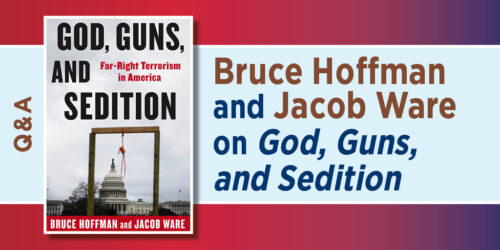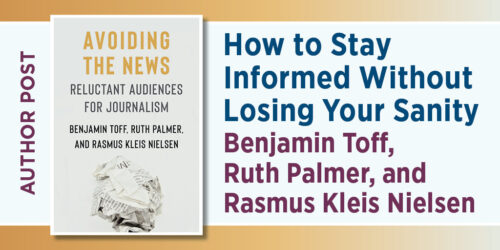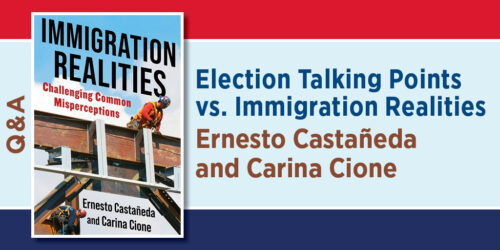Ian F. McNeely on The University Unfettered

Public universities are thriving despite all their flaws. The University Unfettered: Public Higher Education in an Age of Disruption, an insider account of how a typical research flagship institution runs, takes a surprisingly optimistic view on higher education today. It rebuts the left’s claim that universities have been captured by private interests and the right’s claim that they have been captured by the left. Written by Ian F. McNeely, a historian of knowledge who became a practicing administrator, The University Unfettered offers a bracing real-world corrective to the bruising debates that engulf universities today.
Q: There are lots of books out there on higher education. What makes this one unique?
Ian F. McNeely: To my knowledge, this is the only book that describes how research universities work on the inside. I use one public flagship university as an anonymized case study to treat everything from teaching and research to budget management and grand strategy—plus, of course, politics.
We already have shelves of books about what universities do well or do badly and how they need to change. Although many are superb, most are written by people who stand outside or above university administration—professors, journalists, policy intellectuals, former presidents. My approach is empirical, not normative. It depicts life in the trenches. It narrates what happens in the “room where it happens.” It reveals how universities are already dynamic and responsive at a deeper level than clarion calls for reform can really capture.
Q: What moved you to write this book?
McNeely: I wanted to use my skills as a historian to process my personal experience as an administrator. After the Great Recession struck, I dove into leadership positions because I sensed that the 2010s would see major disruptions in public higher education. It was like being a kid in a candy store. Universities are fascinating machines, and working down in the engine room was incredibly gratifying—even during moments of crisis and strain, and there were plenty of those. After COVID-19, I wanted to look back and analyze everything I had witnessed.
Q: Who should read it?
McNeely: Every faculty member and administrator in the United States! I try to demystify the university for people who already work in one. But I also hope that the writing will appeal to lay readers, including anyone who has ever navigated the politics of a complex workplace. Maybe a few parents will pick it up and be reassured that their tuition checks are being spent wisely. I’d love for university builders in other countries to use the book as a blueprint for what works and as a cautionary tale for what doesn’t.
Q: What makes your case study, which you simply call “The University,” particularly revealing?
McNeely: I wanted to shine a light on the nonelite public research universities that educate millions of college students and conduct an enormous share of America’s scientific and scholarly research. Our public debate is far too dominated by the Ivy League, the “Ivy Plus,” and the public Ivies. As a country, we are obsessed with elitism, meritocracy, prestige, wealth, and all the symbolism that enshrouds these institutions (no offense to Columbia!).
My focus is on the classic state schools that helped forge the middle class during the twentieth century. Public universities have been neglected by the media just as the middle class has been neglected by our politics. If we want the one, we have to continue supporting the other.
Q: So what do you mean when you say that “the public university as we once knew it is gone and never coming back?”
McNeely: For much of this century, state legislatures reduced funding for public universities while shifting the cost to private consumers in the form of higher tuition. Rather than call for a return to a Golden Age, my book takes stock of the new normal. I show how state universities have maintained their public commitments as best they can under a new financial model.
There’s a lot in the book about corporate management techniques—labor relations, performance metrics, strategic plans, PR consultants, brand management. I find a lot of this stuff distasteful, but my conclusion is that our core values persist. This was the biggest surprise coming out of the book. Far from subverting their mission, a competitive marketplace sharpens universities’ commitments to the public good.
Q: Does “unfettering” mean that you are in favor of privatization and deregulation by governments and public officials?
McNeely: No to privatization but yes to deregulation. I argue that state and federal governments should set the rules, pay the bills, monitor performance—and then get out of the way. Above all, politicians should eschew meddling with academic freedom at all costs. Competition will take care of the rest. Again, I try to make that case empirically, with evidence and analysis, and not just engage in wishful thinking or special pleading.
Q: Why do you believe in competition?
McNeely: It’s a lesson I take from the history of knowledge. Friendly rivalries fuel the search for knowledge as far back as you want to look—from the nineteenth-century German research universities to the urban universities of the Middle Ages to the philosophical schools of ancient Greece and Rome. The genius of our fifty state university systems in the United States is that we have harnessed that same competitiveness to build a democracy. We take interstate (and in-state) rivalries for granted on the football field. I show that same dynamic at work in how universities function internally.
Q: What has happened to your optimism in the wake of recent political attacks on universities?
McNeely: It’s a poignant irony that this book, with this title, has appeared with this press, this year. Universities, public and private, are factories of goodness. They deserve to be cherished, not attacked. Full stop.
If there’s any reason—I won’t say justification—for what’s happening, it lies with problems that are beyond universities’ control. I argue in the book that one root cause of populist attacks on higher education is the tragic gap in life expectancy between those with and without college degrees. The United States has treated public higher education for far too long as a surrogate for our missing welfare state and our failing social safety net. Now we’re reaping the consequences of that policy failure in the most unjust and destructive way.
Q: Any hope for the future?
McNeely: Here I do confess to some wishful thinking. I hope that because education is a function of the fifty states, states will protect their universities for as long as this period of disruption lasts. But it may end up that this book provides one last snapshot of how the public university used to work in America. The search for knowledge will go on no matter what, perhaps just in other countries more hospitable to academic freedom.
Categories:Academia/EducationAmerican HistoryAuthor InterviewHistorySociology
Tags:Academiaacademic freedomAcademic InstitutionsCompetition in Educationeducation policyEducation Reformhigher edhigher educationIan F. McNeelyPublic UniversitiesStay InformedThe University UnfetteredUniversity Governance







